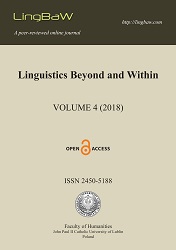Pre-D non-possessor positions in Hungarian
Pre-D non-possessor positions in Hungarian
Author(s): Judit Farkas, Krisztina KarácsonyiSubject(s): Syntax, Comparative Linguistics, Finno-Ugrian studies
Published by: Wydawnictwo KUL
Keywords: pre-D non-possessors; Hungarian; German; deverbal nominals;
Summary/Abstract: The paper investigates pre-D non-possessor positions in Hungarian. In Hungarian, non-deverbal nominal constructions containing pre-D non-possessor positions are acceptable only if they contain a demonstrative pronoun and also an adjective, and the appearance of a pre-D possessor does not impact the acceptability of the sentence. The paper also gives a brief discussion of similar constructions with pre-D non-possessors in German, mainly to shed light on the Hungarian data. Although German also allows for pre-D non-possessors, it does so under different conditions. A short topicalized element can readily appear in German sentences as a non-possessor dependent, but in this language a possessor can never appear in the same noun phrase. The paper also discusses deverbal nominal constructions with pre-D non-possessor dependents in Hungarian. In these constructions the presence of a possessor argument is indispensable. This is due to the fact that the placement of the non-possessor argument in a position preceding the possessor is legitimized by the fact that the former takes scope over the latter within the internal information structure of the matrix noun phrase. The paper also deals with the syntactic structure of said deverbal nominals.
Journal: Linguistics Beyond and Within (LingBaW)
- Issue Year: 4/2018
- Issue No: 4
- Page Range: 38-50
- Page Count: 13
- Language: English

